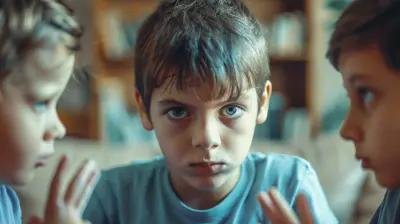Encouraging Problem-Solving Skills in Your Toddler's Playtime
21 June 2025
As parents, we're always looking for ways to help our little ones grow into independent, confident thinkers. And guess what? Playtime isn't just about fun—it’s a goldmine for developing problem-solving skills!
Ever watched your toddler struggle to stack blocks or figure out how to fit a shape into a sorter? That’s their little brain at work, building critical thinking skills without even realizing it. Encouraging problem-solving in playtime not only strengthens their cognitive abilities but also boosts patience, creativity, and resilience.
So, how can you make playtime more about discovery and learning while keeping it fun? Let’s dive into some practical ways to encourage problem-solving skills in your toddler’s daily play! 
Why Problem-Solving Skills Are Crucial for Toddlers
Problem-solving isn't just about finding answers—it's about figuring things out. From resolving conflicts over toys to mastering a puzzle, toddlers develop essential skills that will stay with them for life.Here’s why it matters:
- Boosts cognitive development – Helps them think independently and analyze situations.
- Improves patience and persistence – Teaches them to keep trying instead of giving up.
- Encourages creativity and innovation – Allows them to think outside the box.
- Builds confidence – Helps them feel proud of their accomplishments.
When children engage in problem-solving from an early age, they become better at handling challenges in school, relationships, and later in life. That’s a win-win, right? 
How to Encourage Problem-Solving in Playtime
Creating an environment that nurtures problem-solving doesn’t require expensive toys or complex activities. Everyday play can sharpen your toddler’s skills without them even knowing they’re "learning."
1. Introduce Open-Ended Toys
Toys that encourage hands-on exploration are great for problem-solving. These include:- Building blocks and LEGO Duplos – Encourage structural thinking and creativity.
- Shape sorters and stacking rings – Help with spatial awareness and analytical skills.
- Magnetic tiles and puzzles – Develop logical thinking and patience.
Unlike toys that only have one function (think battery-operated toys with buttons that light up), open-ended toys give toddlers the freedom to experiment, test ideas, and solve little problems on their own.
2. Let Them Struggle a Bit
It’s tempting to jump in and "fix" things when we see our child getting frustrated. But hold on—struggle is part of learning! Instead of solving the problem for them, offer guidance:- If they can’t fit a puzzle piece, ask, "What if we turn it another way?"
- If blocks keep falling, say, "Hmm, maybe we need a stronger base. What do you think?"
Giving them space to figure things out teaches resilience and patience!
3. Encourage Pretend Play
Little minds work hard when they engage in imaginative play. Role-playing games like playing "house," "store," or "doctor" encourage toddlers to think critically, make decisions, and solve social problems.For example:
- Playing "restaurant" teaches them how to serve "customers" and problem-solve when "food runs out."
- Acting as a doctor encourages empathy and finding "solutions" to help their plush patients feel better.
Plus, it's ridiculously adorable to watch their imagination unfold!
4. Ask Open-Ended Questions
Instead of giving answers, guide their thinking with questions like:- "What do you think will happen if we do this?"
- "How can we make it work differently?"
- "Why do you think that happened?"
These types of questions get toddlers thinking rather than just following instructions.
5. Introduce Simple Problem-Solving Games
Games that require decision-making can enhance logical thinking. Try fun activities like:- Sorting games – Give them different colored objects and ask them to sort by color, shape, or size.
- Treasure hunts – Hide a small toy and give them clues to find it.
- Obstacle courses – Set up couch cushions or chairs as an indoor "maze" to navigate through.
These activities teach them to analyze, adapt, and find solutions.
6. Let Them Make Mistakes
Mistakes are golden learning moments. Instead of saying, "That’s wrong," try:- "Hmm, that didn’t work. What else could we try?"
- "Ooh, let's see if there's another way to do it!"
This shows them that it’s okay to fail and try again, which is an essential life skill!
7. Encourage Outdoor Exploration
Nature is an incredible problem-solving playground! Let them:- Experiment with pouring water into different-sized containers.
- Try building a sandcastle that won’t collapse.
- Figure out how to climb a little rock or balance on a log.
Outdoor play naturally encourages thinking, adjusting, and experimenting!
8. Model Problem-Solving Behavior
Kids learn best by watching you. When you encounter a simple problem, talk out loud about how you’re solving it:- "Uh-oh, we’re out of milk! What can we do instead?"
- "This puzzle is tricky! Maybe I can start with the edges first."
Seeing you work through everyday challenges teaches them valuable problem-solving skills. 
The Power of Play-Based Problem-Solving
When playtime is sprinkled with problem-solving, toddlers naturally become independent thinkers. They develop the confidence to make decisions, adapt, and keep trying, even when things don’t work out on the first try.It’s amazing to watch their little faces light up when they finally get that puzzle piece to fit or build a tower that doesn’t topple! These small victories shape their mindset, giving them the tools to tackle bigger challenges as they grow.
So, the next time your toddler is deep in play, resist the urge to step in too quickly. Instead, give them the space to struggle, experiment, and discover their own solutions. Because in those little moments of challenge—that’s where the magic of learning happens!
Final Thoughts
Encouraging problem-solving during playtime isn’t about making things hard—it’s about giving toddlers the opportunity to think, explore, and figure things out. By providing open-ended toys, asking thoughtful questions, and letting them make mistakes, you’re setting the stage for a confident and capable little problem-solver.And the best part? You don’t need fancy gadgets or elaborate activities—just a little patience and lots of encouragement.
So next time your child faces a small challenge in play, take a step back, offer a gentle nudge, and watch their brilliant little mind at work!
all images in this post were generated using AI tools
Category:
Toddler MilestonesAuthor:

Max Shaffer
Discussion
rate this article
2 comments
Zella Robinson
What a wonderful article! Encouraging problem-solving skills during playtime is essential for toddlers’ growth and confidence. By fostering creativity and resilience, we equip our little ones with valuable tools for the future. Thank you for sharing such insightful tips and strategies for joyful learning!
September 29, 2025 at 3:40 PM

Max Shaffer
Thank you for your kind words! I'm glad you found the tips helpful for fostering creativity and resilience in toddlers. Happy exploring!
Judith Sanders
Why wait for life’s curveballs? Let your toddler tackle puzzle pieces, not just toys! Playtime is their mini boot camp—get those little brains flexing. After all, 'I can't' is just 'I haven't learned...yet!'
July 2, 2025 at 4:17 AM

Max Shaffer
Absolutely! Encouraging toddlers to tackle puzzles not only boosts their problem-solving skills but also fosters resilience and a growth mindset. Every challenge is a stepping stone to learning!


